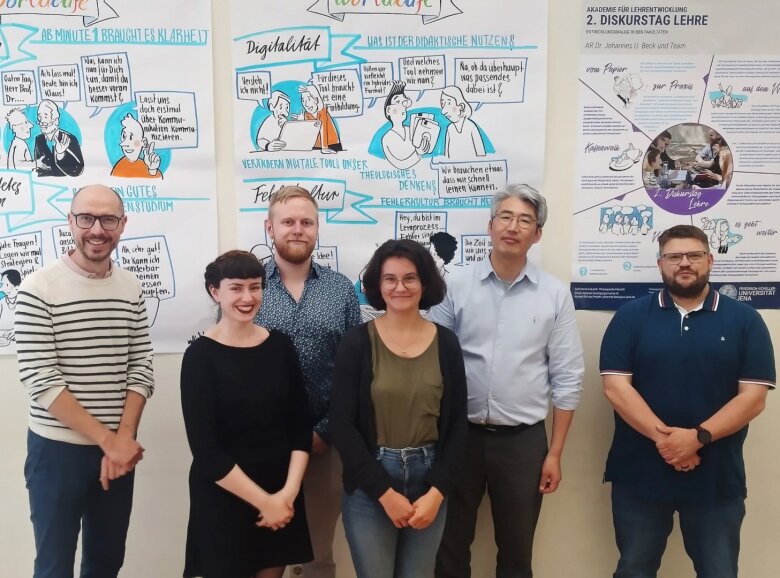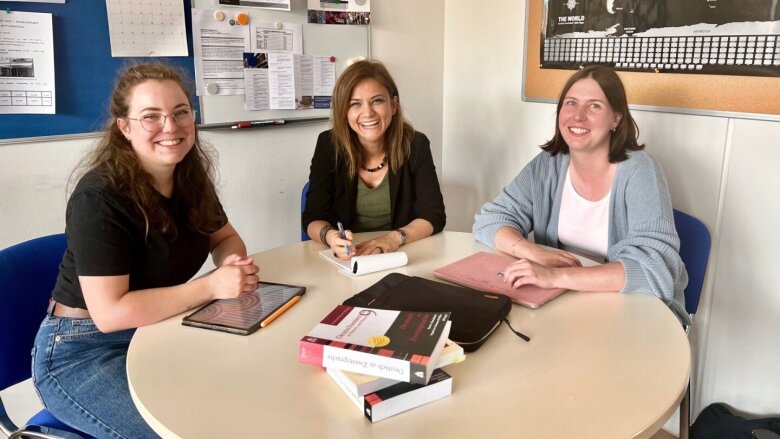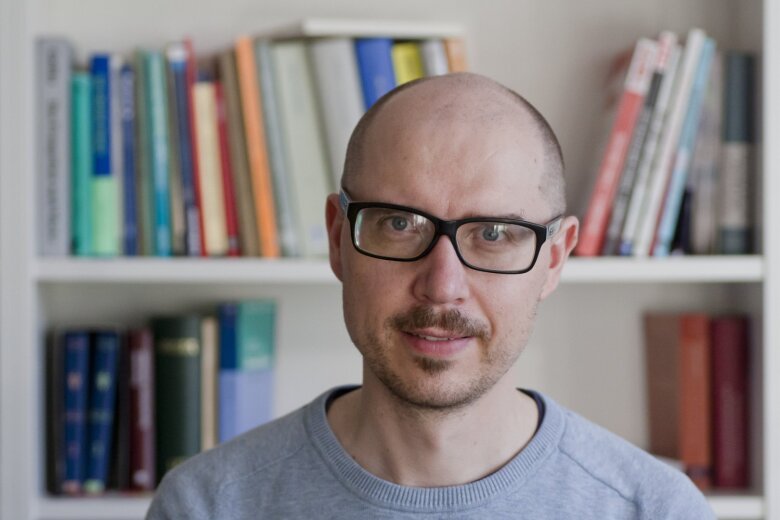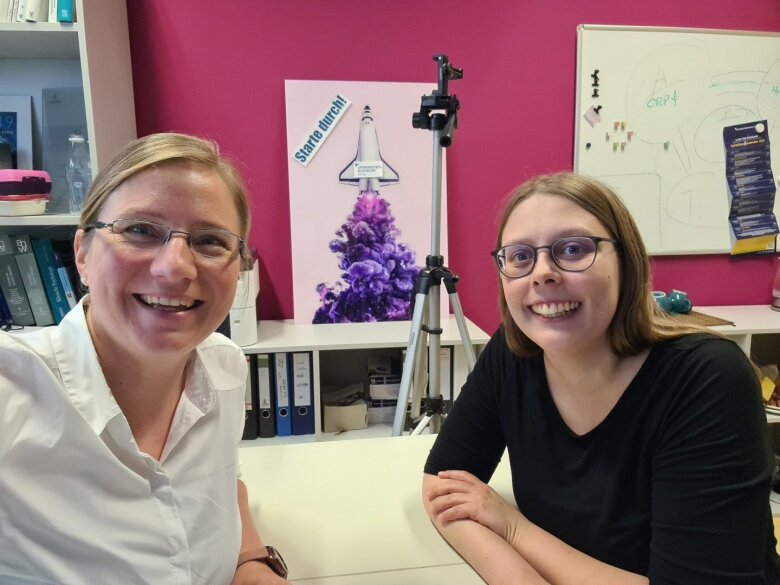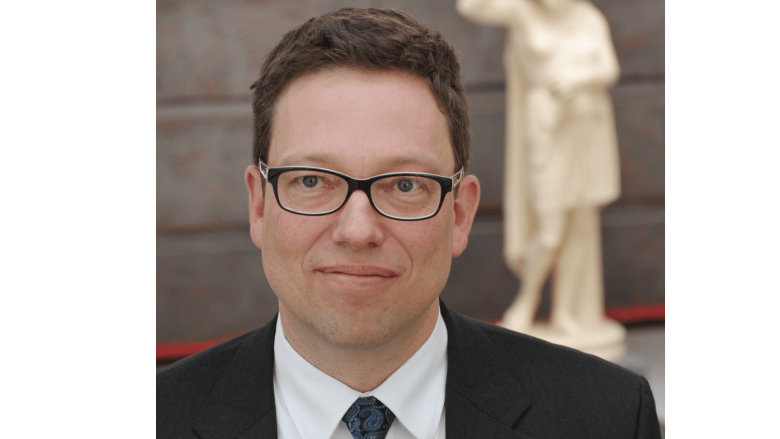
-
3. Discourse day: Teaching at the faculty of theology (funding decision: winter semester 2023/24)
project team (f.l.t.r.): Dr. Johannes U. Beck, Pia Objartel, Tobias Kresse, Paula Wolfram, Tommy Drexel (+3 absentees)
Image: Franz WendlerThe two Teaching Discussion Days, which have already been held at the Faculty of Theology, are milestones in a process in which the discussion about teaching and the resulting effects on teaching practice can increasingly become a natural part of the teaching culture at the Faculty of Theology. The "Principles of Good Teaching" (strategy teaching) and the faculty-related "Quality Characteristics of Theological Teaching" form the fundamental basis of this discourse. It has been shown that the discourse day offers a unique opportunity to reflect on the opportunities for good teaching and the limits of current teaching across all statuses and on an equal footing and to develop concrete design options for teaching at the Faculty of Theology. For this reason, the Faculty of Theology is organising a 3rd, now extended Teaching Discourse Day. The aim is to further consolidate the discourse on teaching, discuss previous practical experiences and provide inspiring practical impulses.
-
Teachers of German as a second language (GFL): situation and requirements, yesterday and today (funding decision winter semester 2023/24)
project team (f.l.t.r.): Elisabeth Ständer , Dr. Nimet Tan (leader), Celina Bausewein
Image: Malina Menzel und Nimet TanAs part of a voluntary seminar, the project offers a platform for encounters and exchanges between graduates and current students of the GFL teaching degree programme as well as subject specialists. On the basis of a targeted survey of working GFL graduates, interests and needs relevant to (school) practice are first identified, which are then taken up in order to develop a supplementary voluntary offer with a training character that gives current GFL students realistic insights into the practical experiences of former GFL graduates, promotes exchange and networking opportunities and also expands the previous knowledge of all participants. In addition to the dialogue between the different generations, guest academics will also enrich the discussion with topic-specific contributions. The seminar thus serves as a bridge between theory-based studies and practical application, promotes intergenerational dialogue and broadens understanding of the diverse aspects and requirements of the GFL field.
-
Artificial intelligence in germanic university teaching (funding decision: winter semester 2023)
project leader Florian Hesse
Image: Florian HesseThe emergence of elaborated AI applications (e.g. ChatGPT) is about to disrupt university teaching. In German studies programmes in particular, this development is causing great pressure to transform. Specifically, the question arises as to which competences students will still have to acquire and demonstrate in examinations in the future if AI tools are already able to handle complex writing tasks today. Another skill is that AI convincingly reproduce the content of primary and secondary literature with regard to specific questions. specific questions.
In order to address this development, the Institute of German Literature organised a closed meeting at which previous experiences of all status groups with AI were pooled and combined with new impulses. The aim was to develop concepts for dealing with AI in learning and examination situations in German Studies based on subject-specific issues and to discuss the further development of degree programme-specific curricula.HereThis link requires a loginde you can find the final project report (URZ login credentials required).
-
2. Discourse day: Teaching at the faculty of theology (funding decision: summer semester 2023)
project leader Dr. Johannes U. Beck
Image: J. Immanuel BeckThe process of developing a continuous, cross-status group discourse on teaching at the Faculty of Theology, which began with the 1st Teaching Discourse Day, will be continued and consolidated with the 2nd Teaching Discourse Day. The 2nd Teaching Discussion Day aims to develop strategies and demonstrate how characteristics and principles can be integrated into everyday teaching and implemented as part of good teaching practice, while the previous forum served to introduce the "Principles of Good Teaching" (Teaching Strategy 2025) and the faculty-related "Quality Characteristics of Teaching". This involves not only presenting and discussing ideas in plenary sessions and world cafés, but also developing, collecting and adopting concrete proposals in a participatory manner. In order to make the results easily accessible for the follow-up process, they are recorded graphically. The format thus also serves the long-term implementation of the "Principles of Good Teaching" within teaching at the Faculty of Theology.
the event: '2. Diskurstag Lehre der Theologischen Fakultät'
HereThis link requires a loginde you can find the final project report (URZ login credentials required).
-
Future Workshop Problem-Oriented Learning (funding decision: summer semester 2023)
project leader: Dr. Caroline Klingner and Dr. Denise Schaller
Image: Dr. Caroline KlingnerThe established teaching format of problem-based learning (POL) in medical studies was subjected to an in-depth evaluation as part of the ‘Future Workshop POL’. In addition to the qualitative survey using structured interviews with students in the 8th semester, an accompanying quantitative data collection was carried out, which was published as part of a scientific paper. The aim was to compare methodological, group-dynamic and didactic aspects of the digital and presence-based delivery of POL and to derive specific potential for optimisation. The findings not only provide a differentiated view of current teaching practice, but also offer a solid basis for the future development and adaptation of POL tutorials to the needs of students.
HereThis link requires a loginde you can find the final project report (URZ login credentials required).
-
Discourse day: Teaching at the faculty of theology (funding decision: summer semester 2022)
project leader Dr. Johannes U. Beck
Image: J. Immanuel BeckThe Faculty of Theology held its first "Teaching Discourse Day" in June 2022 in order to establish a discourse on quality features of teaching at the faculty. The Discourse Day serves the dialogue of all status groups about the "Principles of Good Teaching" (Teaching Strategy 2025) and the faculty-related quality features of teaching. In addition to short impulses and dialogue formats, specific topics such as digitality or the goals of the study of theology were also discussed in a moderated world café against the background.
The respective teaching and learning experiences of the participants were discussed and striking insights were recorded. The insights gained from this were and will be further used for teaching development. The central contents of the discourse day as a whole were also recorded graphically. The resulting posters are presented centrally in the faculty and continually stimulate new discourse in courses and committees. In the long term, a "Discourse Day on Teaching" is to take place approximately annually.HereThis link requires a loginde you can find the final project report (URZ login credentials required).
-
Closed-Door Conference on Ensuring Academic Success (funding decision: summer semester 2019)
Project leader: Prof. Dr Volker Jänich
Image: Anne Günther (University of Jena)The University’s Faculty of Law will hold a one-day closed conference on the topic of ensuring academic success through a modernization of education in the areas of specialization at the Augustinerkloster Erfurt in early September 2019. Law faculties nationwide are complaining about a decline in the number of graduates. Hardly imaginable for many, there is a threat of a shortage of lawyers. A working group at state level, with the help of an expert opinion from the German Centre for Higher Education Research and Science Studies (DZHW), has been searching for the causes of students dropping out. It is striking that students only drop out very late in their studies (on average after 7 semesters, i.e. after the intermediate examination). At the planned closed conference, the Faculty of Law wants to look for ways to make the education in the areas of specialization, which takes place in the critical study phase, more attractive in order to reduce the dropout rate.
Here [pdf, 2 mb] deThis link requires a loginde you can find the final project report (URZ login credentials required).
-
Communication Curriculum (funding decision: winter semester 2018/19)
Project leader: PD Dr Ulrich Wedding
One of the tasks of the Faculty of Medicine is to train future doctors. Communication is an essential tool in the work of a doctor. Teaching future doctors communication skills during their studies at the Medical Faculty of Jena University Hospital and testing them is therefore an essential task of medical teaching. The Master Plan Medical Studies 2020, the National Longitudinal Model Curriculum Communication, the draft bill of the new version of the Medical Licensing Regulations (ÄApprO) and National Competence-Based Learning Objectives Catalogue Medicine (NKLM) of the Medical Faculty Association (MFT) and the Subject Catalogue (GK) emphasise the importance of teaching professional communicative competence in medical studies and the necessity of a longitudinal curriculum. The funding within the framework of the development dialogue has helped to initiate the necessary process in the Faculty of Medicine.
HereThis link requires a loginde you can find the final project report (URZ login credentials required).
-
JeMid—Jena Didactics in Medicine (funding decision: summer semester 2018)
Project leader: Claudia Ehlers
Image: Anne Günther (University of Jena)The Faculty of Medicine would like to develop the teaching offers in the field of medical didactics according to the guidelines of the Medical Didactics Network of Germany. For this, it is necessary to reach a consensus within the faculty. All teachers should be well prepared for their teaching - this includes basic university and medical didactics training. The main focus of the training programme should be on post-doctoral training. In addition, further courses in medical didactics should be offered, e.g. for new teachers at the Jena University Hospital, training in special teaching/examination formats, but also more advanced qualifications (Medical Didactic Qualifications MQ1/MQ2). Cooperation with the Service Centre for Higher Education Didactics (LehreLernen) will be further intensified.
In order to plan a consented ‘JeMid’, the Faculty of Medicine would like to enter into dialogue with its lecturers and involve external speakers. A planning meeting for a one-day workshop is being prepared. A concept presentation in the Commission for Teaching and Studies as well as adoption in the faculty council is being sought.
Here [pdf, 144 kb] deThis link requires a loginde you can find the final project report (URZ login credentials required).
